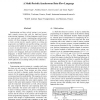Free Online Productivity Tools
i2Speak
i2Symbol
i2OCR
iTex2Img
iWeb2Print
iWeb2Shot
i2Type
iPdf2Split
iPdf2Merge
i2Bopomofo
i2Arabic
i2Style
i2Image
i2PDF
iLatex2Rtf
Sci2ools
118
click to vote
HASE
2008
IEEE
2008
IEEE
A Multi-Periodic Synchronous Data-Flow Language
Implementing real-time critical systems is an increasingly complex process that calls for high-level formal programming languages. Existing languages mainly focus on mono-periodic systems, implementing multi-periodic systems with these languages is possible but inefficient. As a result, current practice usually consists in writing one program for each different rate and then letting a real-time operating system handle the multi-rate aspects. This can be a source of non-determinism as communications between processes of different rates are not precisely defined. We propose a new language, built upon synchronous data-flow languages, to handle multi-rate systems properly. It has strong formal semantics, which prevents non-deterministic communications, and relies on real-time primitives that enable efficient use of existing multi-periodic schedulers.
Control Systems | Formal Programming Languages | HASE 2008 | Real-time Critical Systems | Synchronous Data-flow Languages |
| Added | 29 May 2010 |
| Updated | 29 May 2010 |
| Type | Conference |
| Year | 2008 |
| Where | HASE |
| Authors | Julien Forget, Frédéric Boniol, David Lesens, Claire Pagetti |
Comments (0)

